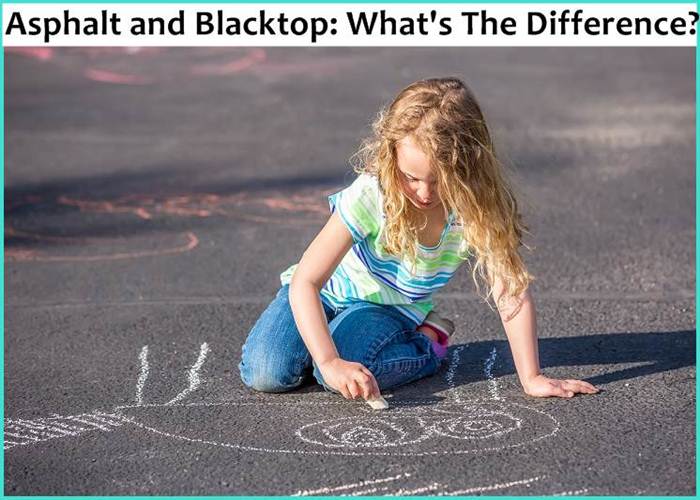Asphalt and Blacktop: What’s The Difference?
When it comes to paving materials, one of the most common misconceptions is that asphalt and blacktop are the same. In fact, it’s not uncommon for people to use these terms interchangeably. Although they share the same ingredients (bitumen and crushed stone), they have differences, particularly in their preparation and composition.
Here we explore the differences between these two paving materials.
Asphalt
Asphalt is among the oldest paving material known to man. It is a black, sticky, semi-solid form of petroleum that is found in natural deposits or as a by-product of oil refineries.
In the construction industry, asphalt or asphalt concrete refers to the mixture of aggregates and asphalt concrete which serves as the binder. Asphalt is prepared by heating it to temperatures above 250 °F. At high temperatures, asphalt becomes turns into a semi-liquid consistency and is highly malleable to pour onto pavements. Once applied onto the road, asphalt is compacted to achieve the desired density. Compaction should be done before the temperature falls below 175 °F.
This preparation process ensures that it will be set properly and withstand the impact of heavy traffic and exposure to the elements.
Uses of Asphalt
With its water-resistant and flexible properties, asphalt is a versatile material that can be used in a variety of applications. According to experts from CSG Sealcoating, Jacksonville, although its primary use is in road construction, it is also used for building waterproofing, reservoirs, soundproofing, pool linings, and cable coatings.
Pros and Cons of Asphalt
Pros
- Smoother than blacktop. Asphalt contains a less crushed stone which produces a smoother finish. This helps reduce noise from the friction between the tires and the road. It also prevents wear and tears in tires and cars.
- Low maintenance costs. Asphalt concrete is water-resistant and durable which allows it to withstand extreme weather conditions. Sealcoating is an affordable preventive maintenance measure that can increase the lifespan of asphalt.
- Safer ride. Asphalt is capable of retaining heat from the sun during the cold months. With this high temperature, ice and snowmelt away ensuring a safe ride for motorists.
- Durable. The composition of asphalt makes it more durable than blacktop. Depending on the thickness, asphalt can carry twice the load of blacktop roads.
Cons
- Regular maintenance. To prevent cracking, maintain its look, and ensure that the asphalt lasts longer, you need to apply a sealcoat one year after installation and every three to five years.
- Environmental impact. The extraction of fossil fuels has long-term impacts on the environment. Specifically, asphalt roads release hydrocarbons into the air causing pollution.
Blacktop
Although blacktop and asphalt concrete share the same primary ingredients, they are mixed differently. Blacktop contains more natural crushed stone compared to asphalt. Since it contains more natural stones, blacktop surfaces sparkle and appear shinier. In fact, asphalt and blacktop can be easily distinguished based on their shininess.
Unlike asphalt, blacktop requires a higher temperature (above 300 °F) to achieve a semi-liquid state and become as malleable as asphalt. A blacktop road can be resealed after harsh weather to increase its lifespan. However, since it contains less binder, blacktop tends to be less durable than asphalt.
Uses of Blacktop
Due to its composition, the blacktop has less capacity to withstand heavier pressures. It is generally used in low-traffic areas like driveways, residential roads, playgrounds, and pathways. Blacktop is also commonly installed in play areas like athletic circuits and outdoor basketball courts.
Pros and Cons of Blacktop
Pros
- Road safety. Blacktop produces a rough surface for a tighter grip for vehicles as well as shoes. This provides better traction and control for motorists, pedestrians, and other users.
- Cheaper installation costs. Compared to other paving materials, blacktop installation is relatively cheaper. Likewise, maintenance cost is also low. Regular sealing can help bring it back to life.
Cons
- Less durable. As mentioned above, the composition of the blacktop makes it vulnerable to wear and tear. It has shorter longevity when compared to asphalt and concrete. Hence, it should only be used in low-traffic areas.
- Prone to wear and tear. With its rough surface and higher concentration of crushed stones, blacktop promoted faster aging. Constant contact with vehicles can eventually abrade the surface.
Both asphalt and blacktop are great paving materials when used for the right project. Knowing the unique properties of both construction materials is important. Hopefully, this post can help you make the right choice.
